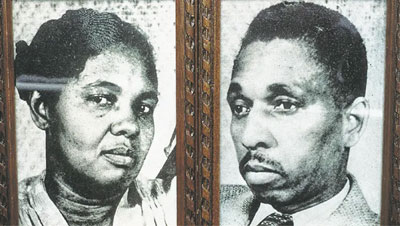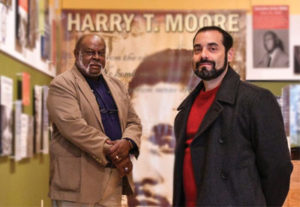

(Malcolm Deemark/Florida Today.)
Efforts to Reinstate Civil Rights Leader Harry And Harriette Moore
Eric Rogers
Florida Today
In 1946, their fight to better the lives of Black Americans in the Jim Crow South cost them their jobs. Six years later, it cost them their lives.
Today, Harry and Harriette Moore — a pair of Mims educators sometimes called the “first martyrs” of the modern civil rights movement — are still broadly unknown, even in the county they called home.
Nearly 70 years after their deaths, that may finally change.
The Brevard Federation of Teachers, with help from the Harry T. and Harriette V. Moore Cultural Complex, are working with Brevard Public Schools to incorporate teaching of the Moores into the school curriculum, ensuring their place among other civil rights heroes in the minds of Brevard students.
The union has also asked the the Brevard School Board to go a step further by posthumously reinstating Harry and Harriette Moore as teachers. It’s a symbolic gesture they say would help restore the Moores’ legacy and go some way toward erasing a black mark on the school district’s rocky racial past.
But correcting the past might not be simple. While Board members say they generally support the idea, just how far they can go to rehabilitate the Moores’ professional lives may depend on the murky details of an incident that happened almost 80 years ago. And if the school board admits it made a mistake eight decades ago, could there be legal consequences for it now?
Union President Anthony Colucci, who is spearheading the effort, said the idea to reinstate the Moores was spurred by the national atmosphere of heightened racial awareness following thecontroversial deaths of George Floyd, Breonna Taylor and others at the hands of police.
Considering some of the inequities people of color experience in Brevard led naturally to the Moores, who lost their teaching positions after Harry Moore’s civil rights activism became too much for an all-white school board to bear.
The possibility of righting that wrong, Colucci said, would deepen an ongoing conversation surrounding racial injustice and perhaps restore some dignity to a pair of early civil rights leaders too often left out of the history books.
“To me, I can’t believe this hasn’t been done already,” he said. “There definitely needs to be more discussion about these things in Brevard County and correcting a major blemish with these great civil rights leaders is a great place to start.”
Your stories live here.
Fuel your hometown passion and plug into the stories that define it.
The ‘first civil rights martyrs’
The bomb went off about 10:20 p.m. Christmas night, 1951.
The explosion rent the foggy night air, booming out across the citrus groves of Mims and sending shattered pieces of the Moores’ home flying in all directions.
Amid the rubble, Harry T. Moore, 46, and his wife Harriette, 49 — Harry a long-time principal and Harriette a teacher in the north county “colored” schools, as they were then known — laid bleeding and broken. Harry Moore died on the way to the hospital, cradled in his mother’s arms. Nine days later, Harriette Moore followed.
The bomb, so carefully placed beneath the floor below the Moores’ bed, had done its job, ending the lives of two Black Americans who had dared to dream of equality in the segregated South.
For decades before Brown v. Board of Education of Topeka, the 1954 Supreme Court case that overturned segregation in schools and kicked off the modern civil rights movement, Harry Moore was fighting to bring that dream to life.
In 1934, he started the Brevard County chapter of the National Association for the Advancement of Colored People and, over the next 17 years, would go on to aid or establish dozens of new chapters across the state.
In 1937, he helped file an ultimately unsuccessful lawsuit against the Brevard County School Board to equalize pay between Black and white teachers — the first of its kind in the Deep South — and in 1944 cofounded Florida’s Progressive Voters League, which went on to register nearly 100,000 new Black voters.
A few years before his death, Moore began to investigate lynchings and other cases of racial injustice, including the infamous 1949 Groveland case in which four young Black men were wrongly convicted of raping a white woman in Lake County.
Harry Moore’s efforts might not have been possible without the support of Harriette, who stood by her husband despite mounting racial and political tensions caused by his growing influence. She also shared, unflinchingly, the many prices Moore paid for his work.
All of this was in the face of often open hostility from white officials in Brevard and across the state, and from groups like the Ku Klux Klan, members of which were ultimately suspected of orchestrating the deadly Christmas bombing, though the case never went to trial.
In his book, Before His Time: The Untold Story of Harry T. Moore, America’s First Civil Rights Martyr, author and journalist Ben Green compared Moore’s prolific work favorably to that of better-known civil rights leaders like Martin Luther King Jr. and Medgar Evers.
“It seems evident that the work (Moore) was doing from 1934 to 1951 … was as courageous, as significant, as groundbreaking for that time as any of the later struggles of the civil rights movement,” Green wrote.
Colucci said Harry Moore has long been a model for his own work with the teachers union.
“Personally, Harry T. Moore has been an inspiration to me in the work I do as an activist in Brevard County,” Colucci said.
“When I was a social studies teacher in North Brevard, I was on the education committee at the Moore Cultural Complex, so I know the story fairly well with the Moores,” he said. “I always greatly admired his courage, intelligence and effort … to start correcting the wrongs in our society.”
Before their lives, their jobs
In 1946, six years before the bomb that killed them, another explosion rocked their personal lives: the Brevard County School Board failed to renew their teaching contracts. With the exceptions of Harriette Moore’s brief stint as a life insurance agent and various odd jobs to supplement their paltry incomes, it was the only career either had ever known.
In an interview with FLORIDA TODAY, Green said it was Harry Moore’s activism that led to their termination.
“Because of the political activism, the NAACP work, (Moore) was seen as a troublemaker,” Green, the biographer, said.
It began with the 1937 lawsuit against the School Board. The suit, which targeted the drastic disparity in pay between Black and white teachers, led to the immediate firing of Cocoa teacher John Gilbert, the only local educator brave enough to add his name to the filing papers.
Moore’s later work with the NAACP and especially the Progressive Voters League, which by 1946 was amassing a Black voting bloc powerful enough to threaten white politicians across the state, was the last straw.
The sudden news of losing their jobs turned the family upside down, Harry and Harriette’s daughter Evangeline Moore told Green during the research for his book.
“This was a horrific event in the family, … a total shock,” Green said. “It was one thing they fired Harry. He was visibly active, but that they fired Harriette too, that they were both out of work. … It was a very scary time.”
Retaliatory firings against Black teachers who challenged the status quo at the time were not uncommon, Green said.
Alongside more violent tactics like beatings and lynchings, such measures were used to keep Southern Blacks cowed and compliant, said William Gary, president of the Moore Cultural Complex.
“Many of the people who were registering to vote were afraid to do that because their jobs were dependent on what their white supervisors wanted them to do,” Gary said. “If you worked for Mr. John, and Mr. John knew you tried to vote, you very likely would lose your job.”


Be the first to comment